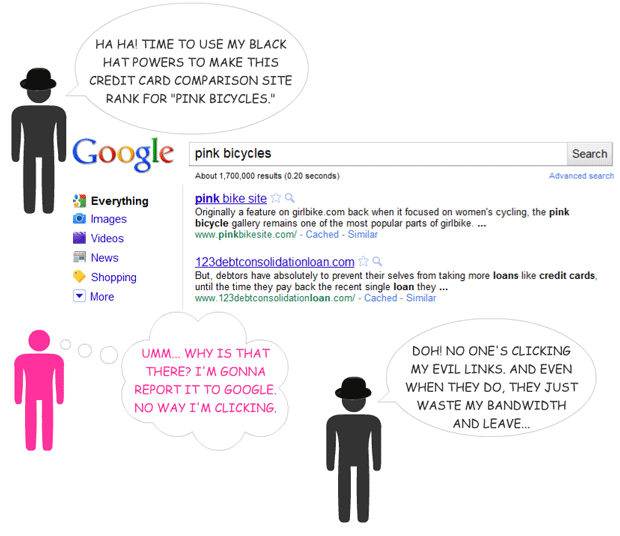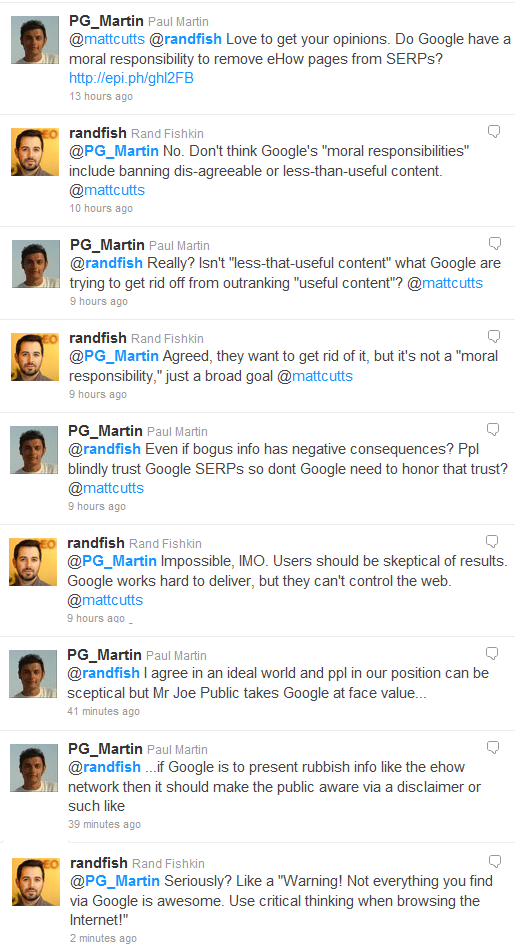
Is SEO Immoral?
The author's views are entirely their own (excluding the unlikely event of hypnosis) and may not always reflect the views of Moz.
Inquiring Quorites want to know:
Is SEO immoral?
We search for relevance via the search engine. By learning and manipulating the system to accomplish its goal, SEO makes it more likely that you will come upon a target that is irrelevant. Thereby, wasting the user's time and resources. It could be considered advertising in the form of a search result.
Is this misleading and counter to the public welfare?
Normally, I'd just leave a response on the Q+A site itself, but in this case, I felt the topic warranted some broader coverage. Let's start by dissecting the points of the question, then tackle the overarching theme.
"By learning and manipulating the system to accomplish its goal, SEO makes it more likely that you will come upon a target that is irrelevant."
This statement strikes me as fundamentally untrue. SEO, like any form of influence humans can have on one another, can be used for good or evil. The great part about SEO, in particular, is that using it to promote irrelevant results is, generally speaking, a fool's errand. I'll illustrate why:

SEO is almost never applied to make non-relevant results rank for unrelated queries. And, I'd go one step further, arguing that if white hat SEO didn't exist, millions of search results would be far worse, as fewer high quality, relevant results would make their content accessible to search engines and well-targeted toward queries.
Complaining about SEO in this fashion seems akin to complaining about demographic profiling in brand advertising. It may irk you that when watching Jon Stewart on the Daily Show, clever advertisers have figured out that you enjoy the delicious, salty cheesiness of Cheetos® snacks* and thus, interrupt Jon's witty banter with pictures and sounds about their product. However, a world without ratings metrics, profiling and advertiser savvy would almost certainly show you far less tempting commercials.
The practice of SEO (Search Engine Optimization) attracts billions of investment dollars and massive amounts of marketers' energies to accomplish three key goals:
- Determine what people are searching for and create content that serves them well
- Make sites, pages and material accessible to search engines so they can display it when relevant searches are performed
- Improve the ranking of already accessible pages so they draw in greater quantities of visitors
The beauty is that in an open, commercial market, those who do the best job creating useful content and marketing it in smart ways earn links and references that lead to higher rankings and greater traffic.
"It could be considered advertising in the form of a search result."
That strikes me as an extremely astute statement, and one that has a host of logic to back it up. Search results are like advertisements, in that you can show to ignore them or engage with them. They require far less time/energy than a traditional brand advertisement, but they also carry no greater weight or special impact. They're merely opportunities to click and discover if you've found something useful + relevant.
I also like the advertising analogy because in SEO, as with advertising, the goal isn't simply to show the ad, it's to inspire action. A terrible ad for a great product is just as useless as a great ad for a terrible product (perhaps worse). Thus, showing irrelevant results or attracting clicks that won't convert or take action is futile. The ad only works if the product can close the deal.
"Is this misleading and counter to the public welfare?"
If SEO is misleading, then so is every other form of influence and marketing (and in many cases, SEO less so than the others). Human beings who were born in the 20th and 21st century recognize marketing and know what it means, how it works and who it serves. I had a good Twitter discussion with Paul Martin of Epiphany on this subject today:

Admittedly, my responses are terse and not as TAGFEE as they should be (challenging to achieve this and provide content in 140 chars. but worth trying harder in the future). But, I'd stand by the general assertion that Google doesn't need a warning label, nor is their sometimes less-than-exemplary fight against content farms cause to abandon hope of good search results or paint them as immoral/unethical. If a site is producing bad content, fight fire with fire - make something better and/or link to something better. I'll start - this is how to make Sardine Spaghetti. Now it's more likely that those querying for a delicious dinner will come across that great link vs. content farmed junk.
Oh man that looks good...
Let's wrap up by talking about the central tenet of the question - Is SEO Immoral?
I believe it would be hard to find a human being on the planet who believes that all three aspects of SEO - researching and producing content people want; making content accessible to machines and promoting already accessible content - are a violation of generally accepted moral principles. There are certainly those on the web who take offense to the manipulation inherent in SEO, but I believe that to be intellectually honest, those who do must also accept that this same manipulation exists in all forms of marketing and promotion. From polishing apples in grade school to writing college applications and resumes to optimizing our Facebook photos to ensure that ex-boyfriends/girlfriends see only our good side, life involves marketing.
It's the "how" that determines whether a marketer or a search engine passes vs. fails the morality litmus test.
p.s. Credit for the inspiration goes to someone made anonymous by Quora; thanks to Outspoken Media for their recent coverage of the site.
* Cheetos® is a registered trademark of a bunch of geniuses who put addictive chemicals in plastic bags.


![How To Create an Integrated Strategy That Increases Brand Mentions and Visibility [Mozcon 2025 Speaker Series]](https://moz.rankious.com/_moz/images/blog/banners/Mozcon2025_SpeakerBlogHeader_1180x400_JamesH_London.png?w=580&h=196&auto=compress%2Cformat&fit=crop&dm=1747780409&s=905f1cf5e166c3b9e1097d1d31a514b2)


Comments
Please keep your comments TAGFEE by following the community etiquette
Comments are closed. Got a burning question? Head to our Q&A section to start a new conversation.